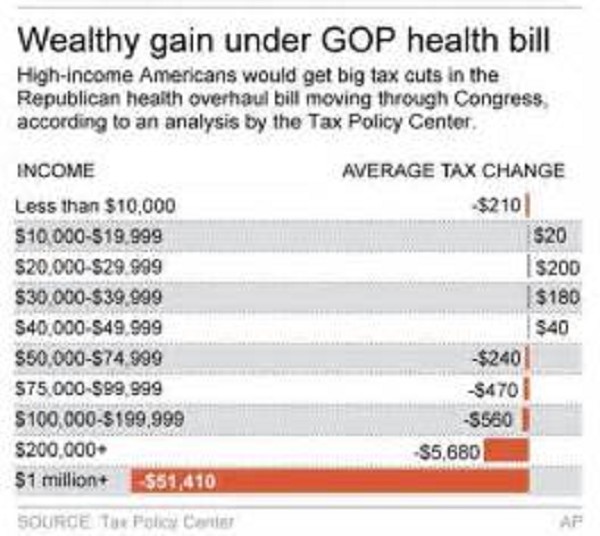| Home | Sports | Community | Arts/Theater | Business | Economy - Local | The Scene |
| History | Health/Fitness | Contests | ||||
BEWARE TAX PLAN: Mott Foundation Says Proposal Will Hurt Charities, People
|
||||||||||
| Printer Friendly Story View |

(EDITOR'S NOTE: Following is a guest column from the C.S. Mott Foundation, Flint, one of the nation's leading charitable organizations.)
A century after Congress approved a federal tax deduction for taxpayers who support charitable causes, lawmakers will soon be considering a tax reform bill that could decrease donations and plunge some nonprofit organizations into financial crisis.
On November 2, 2017, the Trump administration and Republican congressional leaders unveiled the "Tax Cuts and Jobs Act," which includes proposals that nonprofit sector leaders say would result in billions of charitable dollars lost each year.
Items in the new tax reform bill that would have a direct effect on nonprofit finances include a doubling of the standard deduction; repeal of the estate tax; and the likelihood of sharply reduced government social spending. If approved, these changes would alter the policy landscape for the nonprofit and philanthropic sectors, reduce charitable giving and, ultimately, cut funding for programs that help millions of people in the United States.
"There are powerful arguments to be made for doubling the standard deduction, especially for middle-income wage earners," said Jeffrey Moore, chief strategy officer for Independent Sector. "But if we do that, it will move many more people away from itemizing on their taxes to use the charitable deduction and decrease charitable giving by as much as $13.1 billion a year."
President Trump and members of Congress have expressed support for the existing charitable deduction, but it could still be altered, said Dave Biemesderfer, who heads the United Philanthropy Forum.
"Some legislators in Congress simply don't understand that doubling the standard deduction would mean hardly anyone would use the charitable deduction anymore," Biemesderfer said. "It's not enough to just say 'I support keeping the charitable deduction.' They have to understand the interplay between those two things."
Independent Sector, National Council of Nonprofits and United Philanthropy Forum -- all longtime Charles Stewart Mott Foundation grantees -- have been among the leading voices on this issue, working to ensure legislators understand the full impact their tax reform plan will have on giving. Those groups and others hope to inform policies that are fair and continue to encourage generosity.
Currently, about 30 percent of taxpayers itemize their deductions and can take advantage of the charitable deduction. If the standard deduction were doubled, research says the number of "itemizers" would fall to just 5 percent, and giving to charitable causes would sharply decline.
"The charitable deduction is an incentive that works and it's great for our communities," Biemesderfer said. "It's the only deduction that is used to encourage people to do something for which they don't personally benefit."
Moore and Biemesderfer said the simplest solution is a universal charitable deduction, which would be available to all taxpayers -- regardless of whether they itemize on their taxes. Moore said a recent study conducted by the Indiana University Lilly Family School of Philanthropy concluded a universal charitable deduction would recover the $13 billion that could be lost via tax reform, and potentially add another $4.6 billion dollars annually in giving.
The sector's advocacy efforts have contributed to some positive strides. After hearing concerns from his nonprofit constituents, Rep. Mark Walker, a North Carolina Republican, introduced the Universal Charitable Giving Act of 2017 (HR 3988). His bill would provide a deduction with a cap of up to one-third of the standard deduction ($4,000/$8,000 after reform) for taxpayers who do not itemize.
Many nonprofit sector leaders consider Rep. Walker's bill an important first step in the legislative process but worry that a cap on deductible donations could be harmful in the long run. "Historically, caps tend to depress giving over time," Moore said.
Eliminating the estate tax, which is also part of the proposed tax reform, would substantially decrease planned giving of large gifts to charity and compound financial struggles, Moore said.
Tim Delaney of the National Council of Nonprofits, points to a broader, mostly overlooked issue ?--the significant decrease in overall revenues that would result from major tax cuts.
"The consequences are not just to nonprofits, but also to the millions of Americans they serve," Delaney said. "Less tax revenue will mean a vast reduction in domestic spending, for everything from health and safety-net programs for individuals to transportation infrastructure for everyone. Spending cuts, however, never reduce the human need and, in fact, often multiply it."
Those cuts would force more organizations to turn to private philanthropy to fund programs that would be lost otherwise. But Delaney said all of the philanthropy combined simply doesn't have enough money to fill the growing financial gaps created by politicians who are narrowly focused on tax cuts.
"It's not the job of philanthropy to subsidize government," he concluded.
###
| Printer Friendly Story View |
|
|

Guest Columnist |
|
|
|
Printer-Friendly Story View
0200 Nd: 04-16-2024 d 4 cpr 1
12/31/2020 P3v3-0200-Ad.cfm
SPONSORED LINKS
12/31/2020 drop ads P3v3-0200-Ad.cfm


